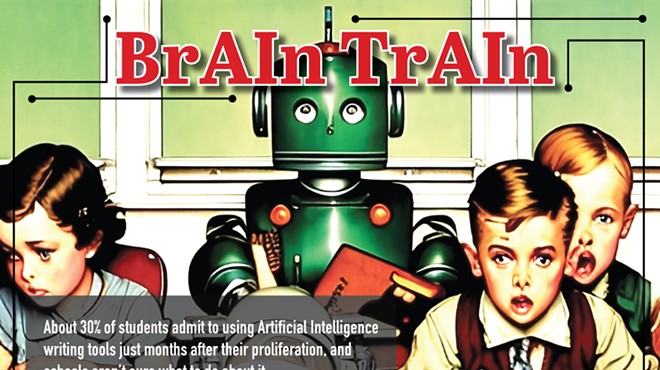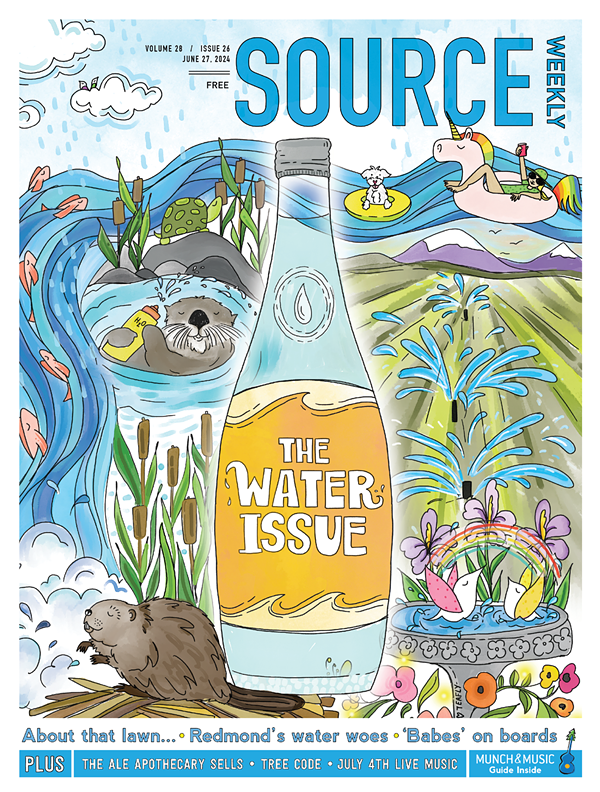This week's issue delves into artificial intelligence in a way that so far, this newspaper has not yet explored. Indeed, perhaps we're late to the party, but here we are. We created this week's cover — a portion of the paper that encourages people to pick it up off the stands and read a while — with the help of a bot, and then enhanced it with the help of our talented design team's hands. Inside, we generated images for some of the stories by simply entering a few key terms into another bot. We generated a story about wildfires as an exploration of how chatbots can churn out content based on past coverage of other fires. All of these efforts were aided by AI, but at this point, none were ultimately delivered to the public without the capable hands and brains of the people who work here.
We went into this issue like a lot of people who are contemplating a shift as major as the one that is currently underway with AI — with a bit of fear and trepidation and perhaps a note of aversion to change. In journalism, there's the concern that machines will one day replace the IRL journalists who report the news, the designers who make that work look beautiful, the copy editors whose vast, arcane grasp of grammar ensures the work looks professional... all of that.
What we learned throughout this exploration is that there are going to be changes to our industry, and to every industry, really — but that what makes our product readable, informative and relatable will only be enhanced by one more tool in the toolbox. In journalism, we can see a day when a chatbot can train itself, via video, on a city council meeting and then churn out a basic report of what happened at that meeting. That's useful and will have a place. But audiences don't turn to outlets like ours just to get a churn-out of a meeting. Audiences want assessment. They want opinions and analysis, based on local knowledge that isn't always available on the internet for a bot to access.
This week's feature story touches on how educators are handling AI in the classroom. In some instances, such as in our local K-12 systems, districts don't yet have policies in place, yet in individual classrooms, educators are working through these minefields themselves as issues arise. It's clear that local districts will have to add this to their list of things to set policy around, sooner rather than later.
What's more, for all of the scrutiny and attention certain parents are putting on the materials that teachers are using in the classroom, it might occur to some of them that there's a more important and long-lasting question they should be asking, such as: "How is my child's ability to think critically and creatively going to be fostered in a world where an academic paper on nearly any topic can be churned out in mere seconds?" A child may not remember that they glossed over slavery in their sixth-grade classroom (not ideal), but their brains will certainly be shaped long-term by the level of expectation their teachers have around creative and critical thinking.
For us, the heady questions such as, "How do we go about fostering creativity in young people in the age of AI?" and, "What's journalism going to look like in the not-too-distant future?" are portions of the same dilemma, and portions of the same opportunity. Sure, we can look to bots to analyze and churn out information that might otherwise be churned out by rote education – but when it comes to the things that really excite people, such as the nuances of a particular city council's political will, or the contours of a work of fiction that takes one to an imagined world... well, we have yet to see a bot achieve that with any measure of success and human interest.
Today, a bot can churn out a perfect press release with no grammar errors, with the right mix of quotes and basic information. But just like spell check has not allowed every poor speller to fly under the radars of their English teachers, the hit of perfection you get from that bot-generated press release or school essay or newspaper article is tempered by its lack of authenticity and voice.
This newspaper has existed for 26+ years in our community because it offers authenticity and voice and a note of humanity one doesn't experience with the publications that regurgitate press releases word for word. AI has enhanced this particular issue and will continue to be an aid for fact checking, imagery and other elements of our local journalism – but people still need people to help them understand their worlds. That's what we'll continue to be here for.
























